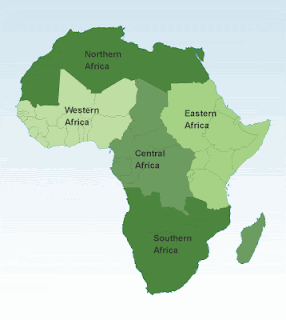According to reports by the African Development Bank, the
commodities price boom of 2008 was a major boost to Africa’s current account
position with earnings from key experts exceeding outflows for imports by a
whopping USD 319 billion that year. But the dramatic drop in prices that followed
a year later (2009) wiped out much of these gains, with earnings from the
continent’s energy export alone falling by USD133billion.
The nature of commodities subjects them to the mercy of
natural and man-made factors that economic models cannot easily explain away.
Within second quarter 2012 alone(March to June 2012) crude oil prices shed a
whopping 30 percent. Also, within decade
spanning 1999 to 2008, crude oil prices rose from $10 per barrel to about $15
per barrel, before falling to below $40 per barrel within another six month
period. All commodities may not be as volatile in price as crude oil; but one
feature that is common with virtually all of them is the regular, swift changes
in their pricing.
For the non-oil, non –agricultural commodities where
demand in the global market is much more elastic, a report released by the
Business Monitor International (BMI; UK; August 10, 2012) predicts that hard
times may await African exporters if the euro zone. They include Tunisia, Congo
(Republic ), Equatorial Guinea, Algeria, Ghana, Cote d’Ivoire, Morocco,
Mozambique, Cameroon , and Mauritius. The commodities that would be hardest hit
include industrial metals such as iron, bauxite, and copper, food products and
diamonds. Also, should the crisis worsen, countries with stronger balance of
payments positions would weather the storm a lot better. In addition, countries
with larger domestic markets and those that are relatively isolated from the
global system would fair better in handling the commodity price shock than
those that are highly externally dependent.
Commodity exporters therefore need to put strategies in
place to guard against or manage price and demand fluctuations whenever they
occur. ‘Saving for the rainy day’ remains one of the options at the disposal of
African commodity net exporters. Accumulating assets in commodity stabilization
funds during periods of price boom they occur. Some African countries now have
sovereign Wealth Funds where the excess proceeds from the difference between
benchmarked commodity price and actual are set aside to cushion the effect of
future price slumps. An African Development Bank report (‘’Managing Commodity
Price Volatility in Africa’’; September 2011) discloses that only about four
African countries absorbed the sudden decrease in energy exports in 2009
relatively well-Nigeria, Algeria, Angola, and Libya- the main reason being the
healthy sovereign wealth and foreign exchange reserve positions they maintained
immediately prior to the price crash.
Also, there is the need for structural buffers that
protect the economies from changing market conditions. Several African
economies do not have a place a commodity price risk management mechanisms,
leaving them perpetual at the mercy of global price upset.
Fiscal prudence and efficient management of natural
resources and earnings from commodity exports remain issue to address. African
countries have had to struggle with the now proverbial ‘resource curse’.
Mismanagement of abundant natural resources not only exposes affected economics
to periodic fiscal shock, it also provokes public discontent, civil wars and
socio-political unrests. Decades of exploitation of abundant natural resources
in some of these countries are yet to impact the lives of the ordinary citizen.
Rising poverty and unemployment is still rife.
The development of a robust democratic structure and a
governance system that is grassroots-based would go a long way in ensuring a
peaceful and conducive atmosphere for the harnessing of Africa’s natural
resources.
The age-long gene of overreliance on single commodity
export should also be broken. Diversification of sources of foreign earnings is
another way of tackling the recurrence of commodity price volatility.
Importantly, African countries should intensify efforts
to boost regional trade within the continent since much of their woes in the
commodities market arise due to influences from the advanced economies. An
increased trade volume between African countries in the global market. A new
World Bank report published on February 7, 2012 captioned “De-fragmenting
Africa: Deepening Regional Trade Integration” shows how the continent is losing
out on billions of dollars potential trade earnings annually owing to high
trade barriers between neighboring countries. The report also confirms that it
is easier for Africa to trade with the rest of the world than with itself.
Culled from Zenith economic quarterly July 2012 and written by Eunice Sampson

No comments:
Post a Comment